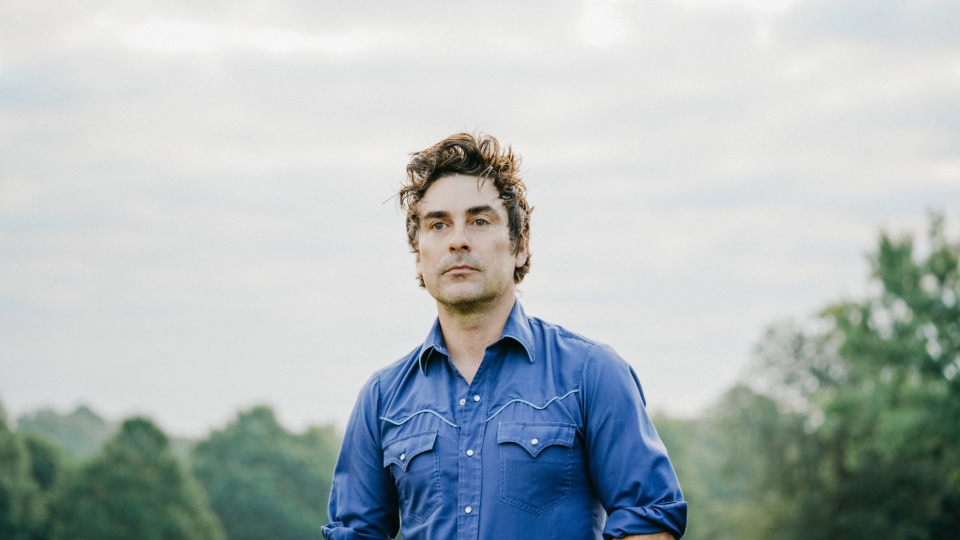Eliot Bronson

Over the course of six albums, indie folksinger Eliot Bronson has created his own brand of atmospheric American roots music. He’s an award winner. A road warrior with audiences on both sides of the Atlantic. An internationally-renowned songwriter with a voice that swoons and sweeps, making fans out of everyone from his hometown newspaper, The Baltimore Sun — who championed Bronson from the very start, hailing him as “a folk singing wunderkind” back when he was still playing local coffeeshops — to Grammy-winning producer Dave Cobb, whose work on 2014’s Eliot Bronson and 2017’s James placed Bronson on the same client roster as heartfelt songwriters like Jason Isbell and Chris Stapleton.
Talking To Myself marks the most meditative, melodic album of his career, with sparse soundscapes that are laced with acoustic guitar, light touches of keyboard, and clouds of reverb. When Eliot’s voice enters each song, it’s like sunlight piercing its way through the fog. “There’s pedal steel, upright bass, and a little bit of electric guitar,” he explains. “Other than that, it’s just me and Damon.”
He’s talking about Damon Moon, the Atlanta-area producer best known for his work with regional indie rock bands. “Damon usually makes records with louder bands,” Eliot says, “and that was interesting to me. I wanted to work with someone who had a different sensibility than I did. He brought a new atmosphere to the album. Instead of playing bass on a song, we’d use a Moog. Instead of playing a shaker, we’d use a brush on the side of a tambourine. We wanted to get outside the box of what an Americana folk singer is supposed to sound like.”
The result is a 10-song showcase of spacey dream-folk, with Eliot Bronson pulling triple-duty as singer, songwriter, and co-producer. On his previous record, Empty Spaces, he wrote about the messy end of a decade-long romance and the start of something new. Portions of Talking To Myself serve as an epilogue to that story, with songs like “From Rabun Gap” and “Are You Still Mean” measuring the distance between past heartbreak and present resilience. Elsewhere, Talking To Myself finds Eliot taking stock of the world around him, turning his personal experience into universal songs about the feelings we all share. “I was writing about loneliness, isolation, and reflection,” he says. “The songs were written or refined during the pandemic, and that’s what I was doing during that period: reflecting. It’s not a pandemic album, but it’s one that reflects the depth of an inner-life cultivated in a unique time in our lives.”
Before the pandemic hit, Bronson had already spent a decade on the road, playing his music to audiences everywhere from Norway to New England. All of that touring came to a halt as the world locked down, but that didn’t stop Bronson from playing shows at home. “I did nothing but play livestreams,” he remembers. “I played 165 weekly livestreams over the course of three years, and I didn’t miss a single week, ever. Those years felt like a personal bootcamp because I got so much better at playing alone. When it came time to make a new record, I knew it wanted to honor that growth by putting myself front and center.”
Talking To Myself was recorded on the outskirts of Atlanta, where Eliot first built an audience as a member of folk-rock duo The Brilliant Inventions. Before moving to town, he’d grown up in working-class Baltimore, within walking distance of the Pentecostal Church where his father and grandfather once preached to congregants who spoke in tongues. His parents drew their inspiration from religion and 1960s counterculture, but Bronson took his own from the records that filled his father’s collection, from folk acts like Bob Dylan, Paul Simon, and Joni Mitchell to the trailblazing blues duo of Brownie McGhee and Sonny Terry. Inspired to make his own music, he began writing songs as a teenager and eventually relocated to Atlanta, where he performed with The Brilliant Inventions for years before winning first place in the Chris Austin Songwriting Contest as a solo act.
Those writing chops take center stage on new songs like “What I’ve Done With My Life” (a retrospective look at an adulthood spent on the run, written with all the honesty and lyrical precision of a long-lost John Prine track), “Wait For Me” (an ethereal love song, painted with watercolor splashes of reverb and fingerpicked guitar), and “Take This The Wrong Way” (a minor-key folk song that’s as haunting as it is gorgeous). Bronson is a diverse songwriter, bouncing between poetic turns-of-phrase and direct narratives, and he’s never sounded so compelling as a vocalist. Whether leaping into his falsetto or singing in a woozy croon, he wrings every ounce of feeling from his lyrics, bringing those emotions to vivid life.
Talking To Myself is an album that balances mood and melody, intimacy and atmosphere, grounded songwriting and astral, ambient arrangements. For a songwriter who’s always dealt with the gray area between genres — or, he puts it, “the in-between colors that we don’t really have words for” — it’s the next chapter in a story that continues to unfold.